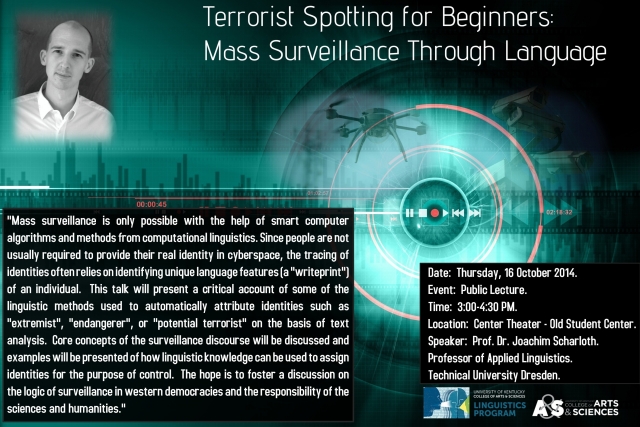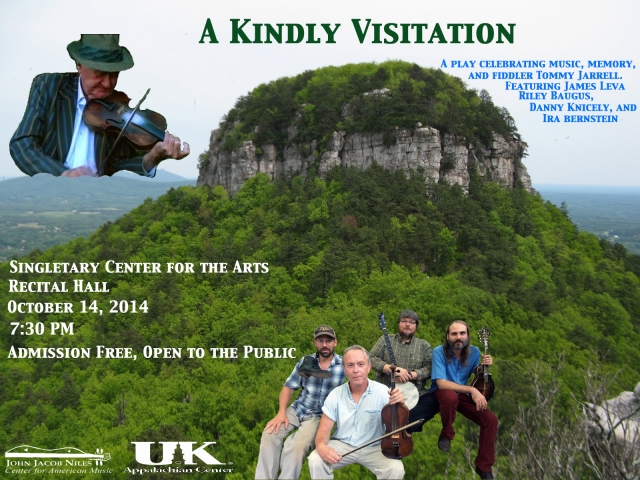Sedimentary, My Dear Watson
Kevin Yeager's lab can measure the rate of coastline loss in Louisiana or document the effects of exposure to radioactive fallout.
Kevin Yeager's lab can measure the rate of coastline loss in Louisiana or document the effects of exposure to radioactive fallout.
For more information regarding this opportunity and more head to: as.uky.edu/education-abroad
The preferred method of donating during the UK United Way of the Bluegrass Campaign for 2014 is payroll deduction. It is so simple and allows you to designate your funds to a specific agency. All donations that do not have a designation request will go into the general funds category and will be used for the most pressing needs in our community.
If you need a tutorial on how to complete the payroll deduction, please visit the link here.
As the official start of the UK United Way Campaign is set to begin on October 1 and run through October 31, I wanted to share with you a brief update on how we are doing so far.
Since the beginning of September, several areas are collecting "Change for Change." I am purposely not counting these funds until the campaign ends with hopes that more contributions will come in via this method of giving to the United Way.
In addition to the "Change for Change" program, we also held our first-ever Chili/Soup Cookoff as a kickoff to our United Way campaign.
Thank you to the following people for their contribution to the Cookoff:
Meaty Chili with Spaghetti -- George White
Bean Soup -- Beverly Clayborne
More than an “s” has been added since the University of Kentucky College of Arts and Science was created in 1908 with only seven faculty members.
You are cordially invited to the
University of Kentucky College of Arts & Sciences
HALL OF FAME INDUCTION CEREMONY
Reception to follow
Friday, Oct. 10, 2014, at 3:30 p.m.
Singletary Center for the Arts
Alumni Inductees: Ethelee Davidson Baxter, ’61, Robert S. Lipman, ’74, Jill M. Rappis, ’80, & George Scherr, Ph.D., ’49, ’51
Faculty Inductees: George C. Herring & Keith B. MacAdam
This will count as a Wired event!
A special 1-credit opportunity to discover text mining and textual data analysis.
Across many disciplines, interest is increasing in the use of computational text analysis in the service of answering questions in the humanities and the social sciences. Media scientists analyze social media in order to predict corporate crises, political scientists and economists look for indicators of mood and sentiment in platform speeches and economic forecasts, literary scholars analyze the distribution of motifs in large numbers of texts in different literary epochs, and social historians and sociolinguists look for networks and connections among the people, places, and times related to the documents they study.
Following the distinction between "digitized" vs. "digital" scholarship, computers not only assist the work of researchers (digitized scholarship) but also transform the basis of the scholarship: they foster research that would have not been possible without digitization and increasing computing power (digital scholarship). Mapping emotions by mining huge numbers of books, or searching all Latin texts from Antiquity for paraphrases of Plato, are only two examples of investigations documenting the innovative potential of digital research. This transformation makes it necessary to reflect on the new relationship of scholars to their objects of investigation and to discuss the new ways researchers handle textual "data".
In this course we will familiarize ourselves with the concepts, debates, and selected tools within text-based digital scholarship and discuss the repercussions on the way we perceive and construct our objects of research.
Mass surveillance is only possible with the help of smart computer algorithms. Whenever text data is monitored by machines, methods from computational linguistics come into play. The main goal is to automatically filter and identify content that points to certain attitudes or behavioral dispositions viewed as a threat to security. When monitoring online data, the task is even more complicated. Since people are not usually required to provide their real identity in cyberspace, the tracing of identities through language features ("writeprint") is another challenge for computational linguistics at the service of the intelligence apparatus. Surveillance through language relies on the idea of the expressive function of language: Whenever we utter something, we do not just say something about the world to someone else, we also reveal something about ourselves.
In my talk I will give a critical account of some of the linguistic methods used to automatically attribute identities such as "extremist", "endangerer", or "potential terrorist" on the basis of text analysis. Starting with an overview of the political, legal, and technical framework of state surveillance measures in Germany, I will discuss core concepts of the surveillance discourse and present examples of how linguistic knowledge can be used to assign identities for the purpose of control. In doing so, I hope to foster a discussion on the logic of surveillance in western democracies and the responsibility of the sciences and humanities.
 Don't miss this opportunity to see and hear the the James Leva Quartet performing A Kindly Visitation, a play about fiddler Tommy Jarrell. This event is free and open to the public! The performing quartet is James Leva, Riley Baugus, Danny Knicely, and Ira Bernstein. The play starts at 7:30 in the Recital Hall of the Singletary Center for the Arts on Tuesday, October 14, 2014.
Don't miss this opportunity to see and hear the the James Leva Quartet performing A Kindly Visitation, a play about fiddler Tommy Jarrell. This event is free and open to the public! The performing quartet is James Leva, Riley Baugus, Danny Knicely, and Ira Bernstein. The play starts at 7:30 in the Recital Hall of the Singletary Center for the Arts on Tuesday, October 14, 2014.
Please, join the UK Appalachian Center for a SWAP (Sharing Work on Appalachia in Progress) discussion of Judicial Systems and Institutions in Appalachia from 12 p.m. to 2 p.m. on Monday, October 20, 2014. This will be held at the UK Appalachian Center at 624 Maxwelton Court. Brenda Waugh is an attorney specializing in collaborative law, conflict resolutions, and restorative justice in West Virginia and Washington, D.C. Judah Schept is Asst. Professor of Justice Studies at Eastern Kentucky University and does research on prison expansion in Appalachia. This is a free event, and lunch is provided.
On Friday, Sept. 26, celebrated folk duo Sparky and Rhonda Rucker will perform. The next Friday, Oct. 2, Letcher County's only female fiddle duo, the SkiPdiPPerS, will appear.